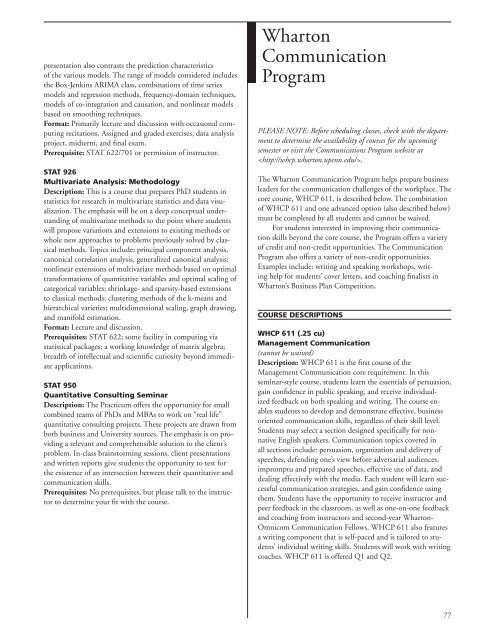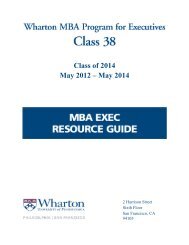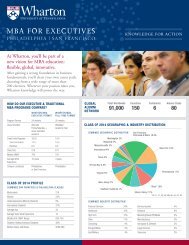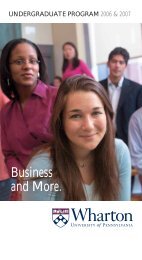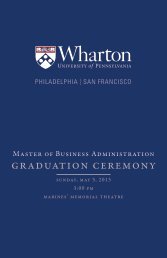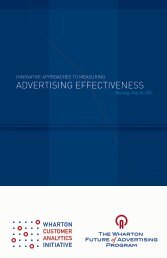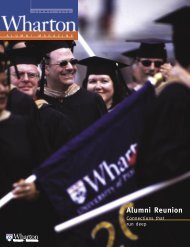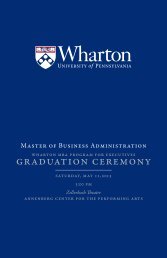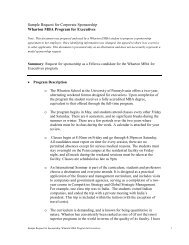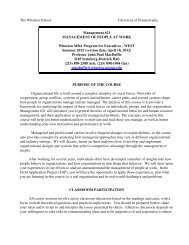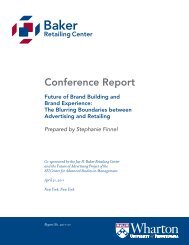Explore Options; Plan Your MBA Academic Program
Explore Options; Plan Your MBA Academic Program
Explore Options; Plan Your MBA Academic Program
You also want an ePaper? Increase the reach of your titles
YUMPU automatically turns print PDFs into web optimized ePapers that Google loves.
presentation also contrasts the prediction characteristics<br />
of the various models. The range of models considered includes<br />
the Box-Jenkins ARIMA class, combinations of time series<br />
models and regression methods, frequency-domain techniques,<br />
models of co-integration and causation, and nonlinear models<br />
based on smoothing techniques.<br />
Format: Primarily lecture and discussion with occasional computing<br />
recitations. Assigned and graded exercises, data analysis<br />
project, midterm, and final exam.<br />
Prerequisite: STAT 622/701 or permission of instructor.<br />
STAT 926<br />
Multivariate Analysis: Methodology<br />
Description: This is a course that prepares PhD students in<br />
statistics for research in multivariate statistics and data visualization.<br />
The emphasis will be on a deep conceptual understanding<br />
of multivariate methods to the point where students<br />
will propose variations and extensions to existing methods or<br />
whole new approaches to problems previously solved by classical<br />
methods. Topics include: principal component analysis,<br />
canonical correlation analysis, generalized canonical analysis;<br />
nonlinear extensions of multivariate methods based on optimal<br />
transformations of quantitative variables and optimal scaling of<br />
categorical variables; shrinkage- and sparsity-based extensions<br />
to classical methods; clustering methods of the k-means and<br />
hierarchical varieties; multidimensional scaling, graph drawing,<br />
and manifold estimation.<br />
Format: Lecture and discussion.<br />
Prerequisites: STAT 622; some facility in computing via<br />
statistical packages; a working knowledge of matrix algebra;<br />
breadth of intellectual and scientific curiosity beyond immediate<br />
applications.<br />
STAT 950<br />
Quantitative Consulting Seminar<br />
Description: The Practicum offers the opportunity for small<br />
combined teams of PhDs and <strong>MBA</strong>s to work on “real life”<br />
quantitative consulting projects. These projects are drawn from<br />
both business and University sources. The emphasis is on providing<br />
a relevant and comprehensible solution to the client’s<br />
problem. In-class brainstorming sessions, client presentations<br />
and written reports give students the opportunity to test for<br />
the existence of an intersection between their quantitative and<br />
communication skills.<br />
Prerequisites: No prerequisites, but please talk to the instructor<br />
to determine your fit with the course.<br />
Wharton<br />
Communication<br />
<strong>Program</strong><br />
Please note: Before scheduling classes, check with the department<br />
to determine the availability of courses for the upcoming<br />
semester or visit the communications <strong>Program</strong> website at<br />
.<br />
The Wharton Communication <strong>Program</strong> helps prepare business<br />
leaders for the communication challenges of the workplace. The<br />
core course, WHCP 611, is described below. The combination<br />
of WHCP 611 and one advanced option (also described below)<br />
must be completed by all students and cannot be waived.<br />
For students interested in improving their communication<br />
skills beyond the core course, the <strong>Program</strong> offers a variety<br />
of credit and non-credit opportunities. The Communication<br />
<strong>Program</strong> also offers a variety of non-credit opportunities.<br />
Examples include: writing and speaking workshops, writing<br />
help for students’ cover letters, and coaching finalists in<br />
Wharton’s Business <strong>Plan</strong> Competition.<br />
COURSE DESCRIPTIONS<br />
WHCP 611 (.25 cu)<br />
Management Communication<br />
(cannot be waived)<br />
Description: WHCP 611 is the first course of the<br />
Management Communication core requirement. In this<br />
seminar-style course, students learn the essentials of persuasion,<br />
gain confidence in public speaking, and receive individualized<br />
feedback on both speaking and writing. The course enables<br />
students to develop and demonstrate effective, business<br />
oriented communication skills, regardless of their skill level.<br />
Students may select a section designed specifically for nonnative<br />
English speakers. Communication topics covered in<br />
all sections include: persuasion, organization and delivery of<br />
speeches, defending one’s view before adversarial audiences,<br />
impromptu and prepared speeches, effective use of data, and<br />
dealing effectively with the media. Each student will learn successful<br />
communication strategies, and gain confidence using<br />
them. Students have the opportunity to receive instructor and<br />
peer feedback in the classroom, as well as one-on-one feedback<br />
and coaching from instructors and second-year Wharton-<br />
Omnicom Communication Fellows. WHCP 611 also features<br />
a writing component that is self-paced and is tailored to students’<br />
individual writing skills. Students will work with writing<br />
coaches. WHCP 611 is offered Q1 and Q2.<br />
77


